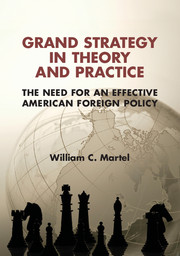2 - Contemporary Classics in American Grand Strategy
Published online by Cambridge University Press: 05 January 2015
Summary
There are four disciplinary approaches to the study of American grand strategy. Each approach has a valuable contribution to make because each offers a different perspective on the key determinants of American grand strategy and then recommends certain policies on the basis of this analysis. The first approach is the study of grand strategy through the lens of American history. This historical approach is led by such academics as John Lewis Gaddis, Paul Kennedy, Walter Russell Mead, and Williamson Murray. It could also be dubbed the Yale school of American grand strategy, since two of the professors (Gaddis and Kennedy) are in Yale’s history department. They see the approach as developing not in accordance with some general social scientific theory, but evolving as part of the unique political, cultural, and social conditions that exist in each state.
In the second approach, social scientists study American grand strategy through the lens of theory. They use more deductive than inductive reasoning, which means that American grand strategy is best explained in terms of general theories rather than specific historical and evolutionary developments. Social scientists downplay, if not totally ignore, the exceptional nature of the United States as a government and treat it more or less like other states, each of which is rationally pursuing its own self-interest. Social scientists tend to treat states as equivalent and operating in an international system that is primarily characterized by the distribution of military and economic power. Although this represents an important level of analysis, it is not a complete framework for analyzing the evolution of grand strategy.
- Type
- Chapter
- Information
- Grand Strategy in Theory and PracticeThe Need for an Effective American Foreign Policy, pp. 7 - 20Publisher: Cambridge University PressPrint publication year: 2015



